Choose any developer marketplace and you’ll see the same talking points: “elite talent,” “rigorous vetting,” “fast results.” But once you dig past the homepage, most of those big promises melt away behind AI screening, mystery fees, and a sea of developers who look good on paper but disappear when it’s time to deliver.
Lemon.io built its process backward from what founders and technical leads actually need: hard evidence of skill, not just big words and badges. Our 98.8% rejection rate isn’t a marketing stat—it’s why founders see a real, immediate difference in code quality, reliability, and speed to launch. We screen human-to-human with zero patience for shortcuts, and it shows up in the work.
This article isn’t here to give polite participation trophies. You’ll see where Lemon.io outpaces every major competitor, and where the others rely on jargon, shortcuts, or processes that just don’t hold up when the real work starts.
Who’s Who in the “We Vet Developers, Promise!” Olympics
There’s no shortage of platforms claiming they’ve cornered the market on developer quality. Most lean hard on big numbers, bold headlines, and some flavor of “AI does the work.” Let’s line up the top competitors and cut through the homepage bravado, one by one.
Toptal
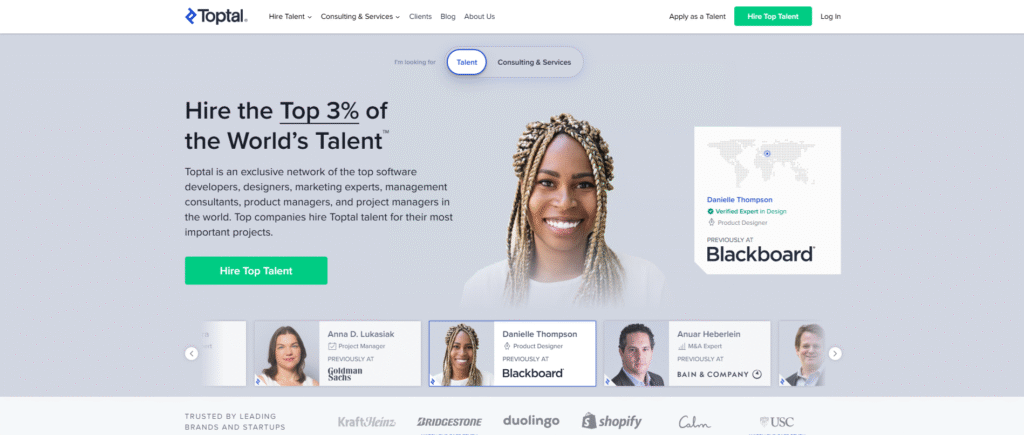
Toptal launched the “top 3%” marketing strategy and runs with it. Its vetting is rigorous, its onboarding is slow, and its pricing is designed for companies with an enterprise budget.
If you want to see a candidate, you’ll pay a subscription just to enter, plus a deposit, then $60-200+ an hour once you start. The experience is buttoned-up and full of forms—think more corporate recruiter than hands-on problem solver.
Best for enterprises with time, layers of approval, and the need to show they “left no stone unturned.” But for startups, it’s overkill and overpriced.
Andela
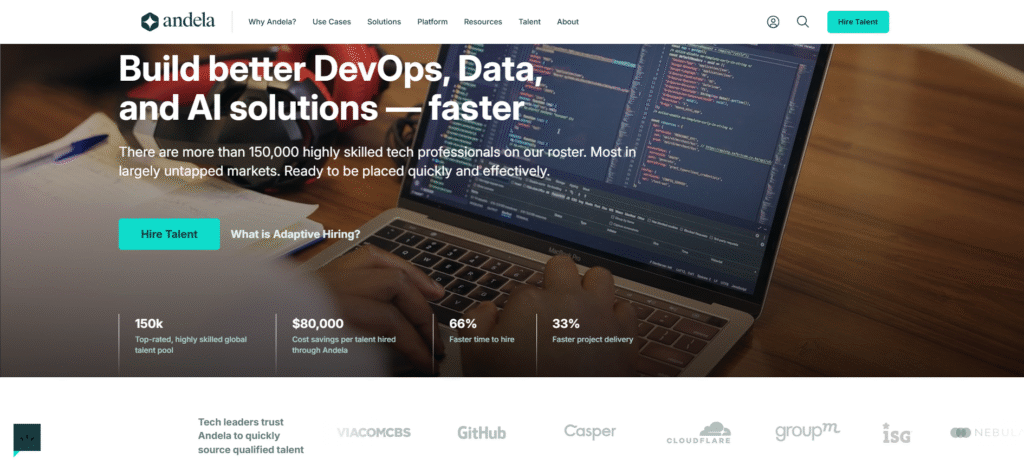
Andela pitches global reach with a heavy focus on emerging markets—mainly Africa, Latin America, and Eastern Europe. Its AI-powered talent cloud promises rapid placement and a big pool of developers at below-enterprise rates.
Pricing is flexible, and the platform manages payroll and compliance, but its process can involve a time-consuming psychometric gauntlet. Most talent trends junior to mid-level, which explains the budget-friendly options but leaves a gap if you need hard-earned senior experience.
Best for companies that need reasonable rates, a large bench, and are happy to grow juniors or mids. Not built for founders who need a senior lead to ship something mission-critical, fast.
Turing

Turing markets itself as the “AI-powered platform” for remote global devs, emphasizing automation and deep skill profiling. Its matching is fast thanks to machine learning and virtual machines, and pricing undercuts the big names.
Still, its AI-heavy onboarding sometimes misses the human X-factor (and can confuse smaller teams). The platform is growing fast but still lacks the long build track record of more established, people-driven marketplaces.
Best for orgs who want speed, don’t mind lots of virtual vetting hoops, and are comfortable trusting their team’s early days to algorithms—not conversations.
Arc.dev
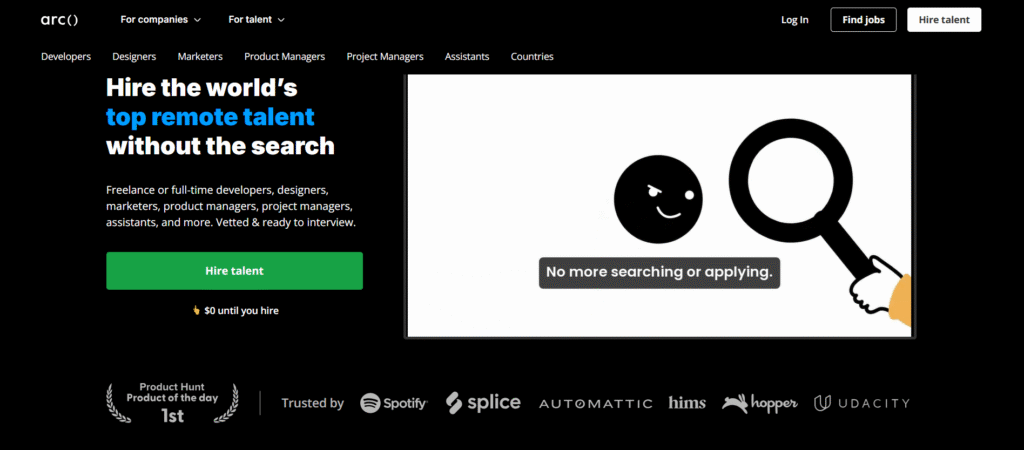
Arc.dev puts a 72-hour guarantee on matches and talks up its “HireAI” for quick, curated results. The network is sizeable and the engagement models are flexible, from freelance to full-time.
You’ll put down a deposit to start, and rates are all over the map—from $60 to $110+ per hour. Transparent fees and a risk-free trial help, but the talent pool’s consistency can swing depending on how the screening went that week.
Arc.dev works if you want a fast, low-commitment option and don’t mind sifting through variability. If your risk tolerance is low, you may want a firmer safety net.
Gun.io
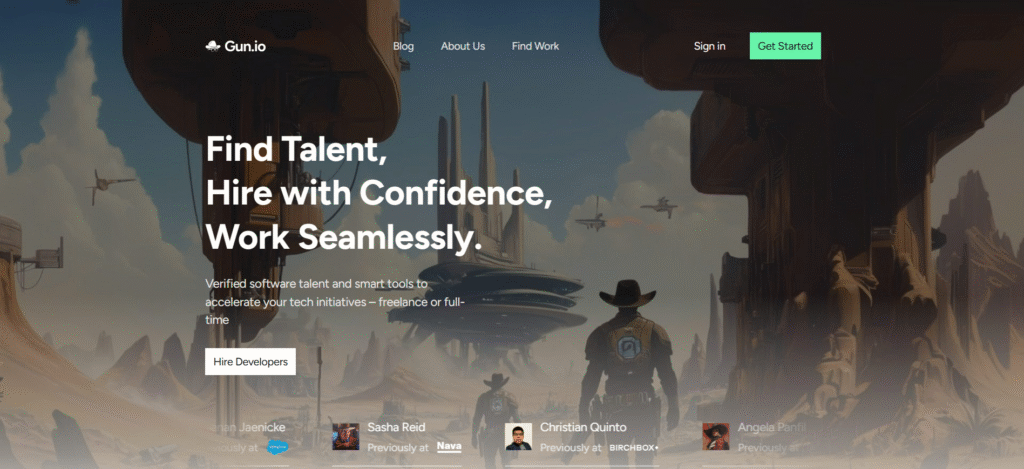
Gun.io is all about the professional freelancer set, with a network that’s smaller but heavily curated through a three-step process: coding test, tech interview, and a soft skills screen. You’ll get clear pricing, flexible contracts, and the kind of support that actually picks up the phone.
But don’t expect instant gratification—finding a match takes closer to two weeks, and nearly everything is geared toward U.S. software gigs.
If you want hand-holding and care more about quality than speed, Gun.io delivers. Just don’t call if you’re in a hurry or building anything outside plain-vanilla software. Not great for speed, volume, or anything outside classic software builds.
Upwork

Upwork has scale and flexibility for days—millions of freelancers, just about every skillset, and a marketplace that lets you set your own rules. You’ll find someone for nearly any budget, but quality control is hit-or-miss unless you opt into Upwork’s “Expert-Vetted” tier.
You’ll pay a project fee, and recent increases (up to 15%) have made Upwork pricier for both sides. The experience is DIY: you do the screening, you chase proposals, you negotiate and onboard. When it works, it’s because you put in the effort, not because the platform weeds out weakness for you.
Best for scrappy managers with time to vet, very specific (often non-dev) needs, or tiny projects. Not for anyone who needs a senior on autopilot or hates sorting through hundreds of profiles.
Index.dev
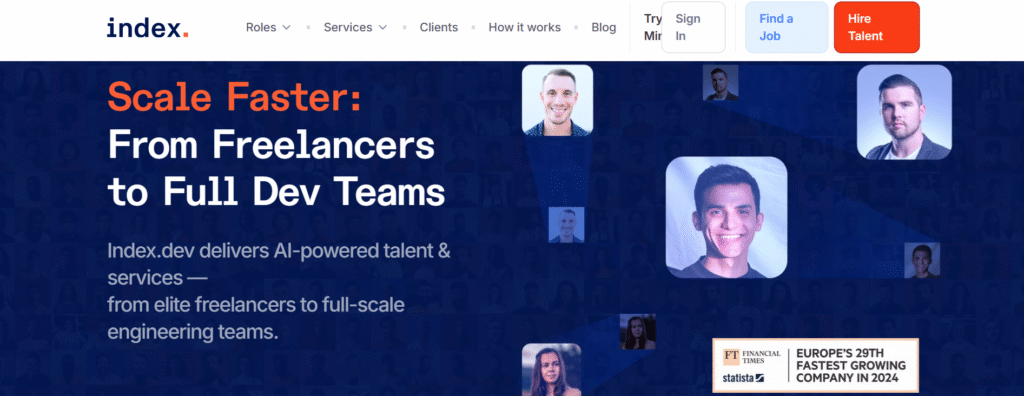
Index.dev focuses on CEE and LATAM tech talent, mixing AI screening with human vetting for a smaller, high-quality pool. Its promise is quick turnaround—matches within 48 hours—and a 5% acceptance rate, with all-inclusive, transparent pricing.
You pay only if you hire, and the platform’s retention and placement stats are strong. But choices are limited by geography, and rates can be higher than some regional players.
Best for teams looking for top-tier but affordable engineers in specific markets, and okay with less global reach. Less suited for anyone building in the U.S. or wanting maximal candidate variety.
X-Team
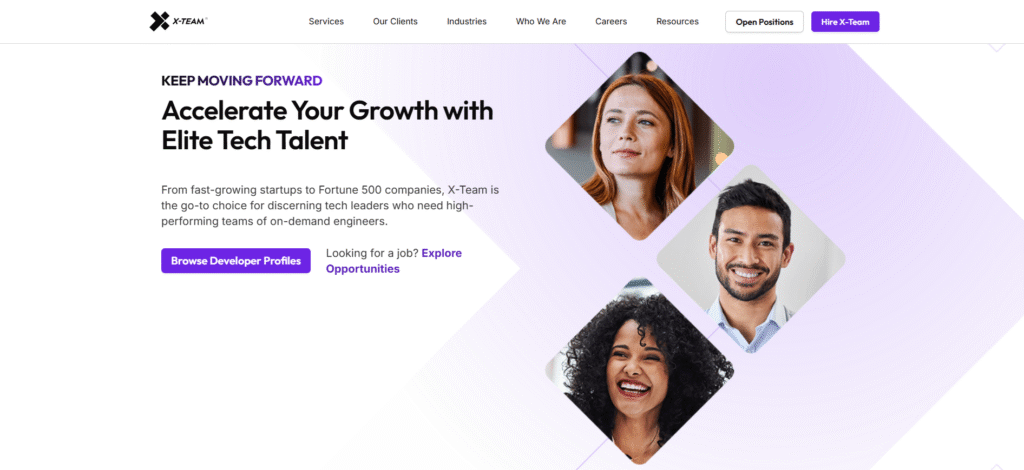
X-Team is all-in on long-term teams, global talent, and a culture-focused pitch. Its network covers 70+ countries, but everything here is tailored for companies that want to sign on for months, not weeks. The headline: solid retention, deep support, and a price tag that usually starts around $12,800 per month.
The tradeoff? You’ll need to commit for at least three months, and costs can stretch startup budgets fast. X-Team is built for scaling established products, not quick-hit projects or early hires.
Best suited for mature teams that want stability, shared values, and an always-on squad. If you want a single dev this quarter, or you shop on price, it’s a mismatch.
Flexiple
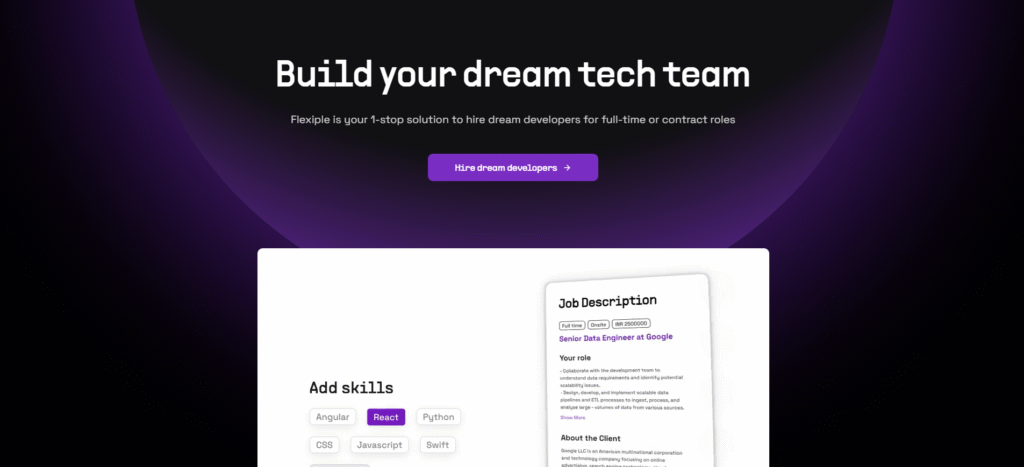
Flexiple pitches a boutique, curated network and fast matches—most hires in 72 hours, handpicked and run through six vetting rounds. Its model is transparent (no hidden fees) and powered by plenty of matching tech.
You’ll find a talent base that skews Indian and mostly junior to mid-level, with rates that stay well below the enterprise giants. Great if you want a lower price point and a small pool to sort through, but don’t expect deep bench strength for niche or highly senior roles.
Flexiple is for startups looking for affordable, pre-vetted help without layers of process or a global search. Not ideal if your must-have list starts with “senior engineer, yesterday.”
Braintrust
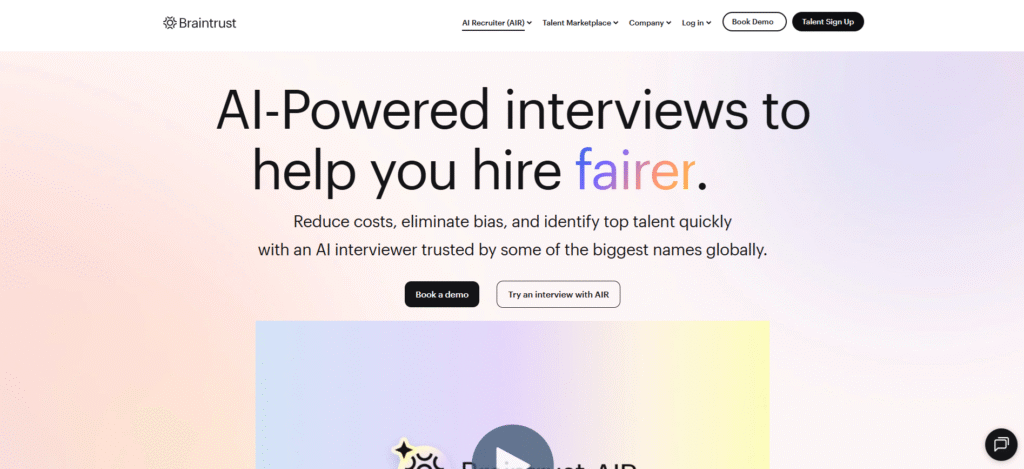
Braintrust is the blockchain-powered, community-owned outlier. Its model: freelancers work for zero platform fees, and clients pay a flat 15%. You get a big, global network and a few novel features—like token rewards and governance input if you’re into that.
The flip side: Braintrust’s talent pool is wide, not deep, and the fee can still add up. If you love decentralization and are okay navigating some learning curve, there’s value here. But traditional teams may find the crypto layer off-putting.
Best for companies who want transparency, community, and a new take on “platform.” Not great for folks who want a guided, frictionless process.
CloudDevs
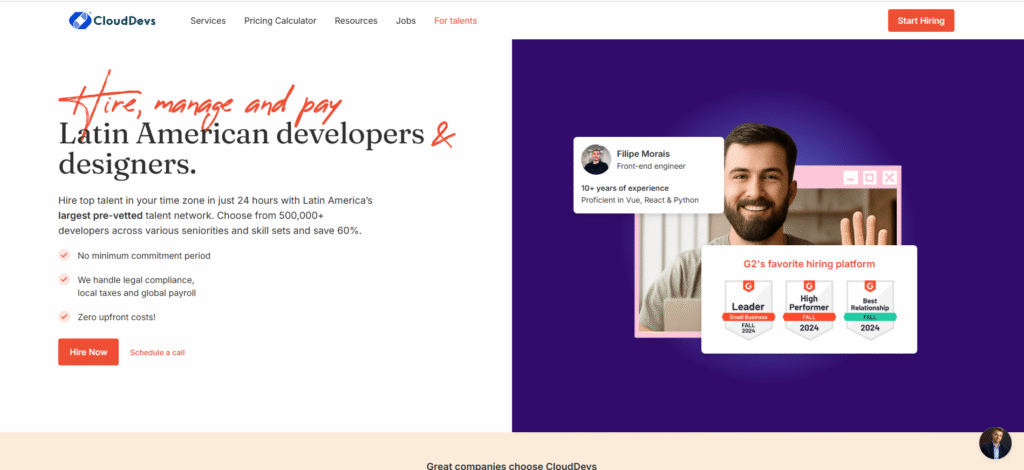
CloudDevs is a LATAM-focused shop guaranteeing a match in 24 hours, and nearly all its talent has 7+ years’ experience. Pricing is straightforward ($45-75/hr), and the platform goes big on time zone alignment for U.S. clients.
It’s a no-brainer if you specifically want senior LATAM developers—and don’t mind putting down a deposit to get started. But if you want European or Asian talent, or a wider range to choose from, CloudDevs just isn’t built for you.
Best for U.S. startups who want senior LATAM engineers—stat. If you’re picky about geography or want global reach, keep looking.
The Vetting Process: Where Lemon.io’s 98.8% Rejection Rate Isn’t an Accident
Most platforms would love you to believe “vetting” means a developer knows their stuff. Dig a little deeper and you’ll find it usually means passing an automated quiz, or getting the thumbs up from an algorithm that couldn’t write a “hello world” if it tried. It’s all fast, but it’s not foolproof—and it’s how teams end up with a developer who can code on paper, but freezes when it’s time to deliver.
Lemon.io keeps real humans in the loop. We double-check resumes, have actual conversations, and make candidates walk through real projects—not just theory. We turn away 98.8% of applicants because most people are fine on paper but can’t fill in the gaps when it matters.
Here’s how our process actually stacks up:
Vetting: Lemon.io vs. Everyone Else
Step |
Lemon.io |
Most Competitors |
|---|---|---|
Experience Review |
A real person checks actual past work, asks questions |
Keyword search or “years in role” filter |
Technical Screen |
Live coding, context, real-world followup |
Timed quiz or generic challenge |
Soft Skills |
Conversation, not checkbox |
“Rate your communication 1-5” |
Problem-Solving |
Practical scenarios, design discussions |
Maybe a logic puzzle, maybe nothing |
Final Call |
Humans compare notes, zero shortcuts |
Algorithm or a single quick pass |
Acceptance Rate |
1.2% make it |
5–30%, sometimes more |
We’d rather disappoint 99 out of 100 applicants than disappoint one paying customer. You get people who’ve shipped real projects and can talk about how, not just why it works.
Technologies Lemon.io Supports (and Actually Stands Behind)
Most platforms brag about covering every tech skill on earth. At Lemon.io, if we list a technology, it means our developers have actually used it to build real products—not just tinkered or followed a YouTube tutorial. If a candidate is still Googling the basics, they don’t make it through our process.
Here’s what we support, and what that looks like in practice:
Category |
Technologies Lemon.io Vets For |
What “Qualified” Really Means |
|---|---|---|
Frontend |
React.js, TypeScript, Next.js, React Native, UI/UX |
3+ years doing this in production, not tutorials |
Backend |
Python (Django), Node.js, Ruby on Rails |
3–5+ years and shipped features you’d recognize |
Cloud/Database |
AWS, PostgreSQL |
Can launch, maintain, and troubleshoot for real apps |
Emerging Tech |
Blockchain, AI/ML, Large Language Models (LLMs) |
Has shipped at least one live project |
Full Stack & Other |
WordPress, Figma, hybrid builds |
End-to-end work, not just a bootcamp project |
Product/Project |
Product management, project management, consulting |
Senior-level, can actually lead a team |
If you want someone who can build, ship, and support real products, start here.
The Fast Match (and the Flexible Miss): How Speed, Quality, and Price Stack Up
If you’ve ever hired through a platform, you know what “fast” usually means: a quick sales call, followed by an invoice, a deposit, and then days (or weeks) of back-and-forth before you even see a shortlist. Or maybe you get instant access, but the only “match” is someone whose resume looks suspiciously generic.
Lemon.io skips the warmup dance. You get properly vetted candidates—matched in as little as 48 hours—with clear pricing and no up-front fees. No managed handoffs, no slow-motion onboarding, and no crossing your fingers that the developer you meet is the one you’ll actually work with.
Platform |
Time to Match |
Upfront Fees/Deposits |
Pricing (Typical) |
Quality/Consistency |
Who It Works For |
|---|---|---|---|---|---|
Lemon.io |
2-14 days |
None |
$45–$80/hr |
Consistently senior; hand-vetted |
Startups, fast-growing teams |
Toptal |
Days to weeks |
Subscription, deposit |
$60–$200+/hr |
Elite, but slow and rigid |
Enterprise, deep pockets |
Andela |
48 hours |
None |
Budget friendly |
Large, global, mixed seniority |
Scale-ups, multi-region hiring |
Arc.dev |
72 hours |
$300 deposit |
$60–$110+/hr |
Quality swings, risk-free trial |
Flexible teams, mid-size orgs |
Gun.io |
2 weeks |
None |
Transparent, varies |
US-focused, craftsman approach |
Hands-on managers, code purists |
Upwork |
Immediate |
None |
Wide range, +fees |
All skill levels, inconsistent |
DIY hiring, low-commitment gigs |
Index.dev |
48 hours |
None |
$50–$85/hr |
High-quality, CEE/LATAM-only |
Niche, affordable, regional |
X-Team |
Days to weeks |
None |
~$80/hr, min. 3 mo |
Stable, long-term only |
Large orgs, ongoing projects |
Flexiple |
72 hours |
None |
$30–$100/hr |
Fast, mostly juniors/mids |
Cost-sensitive, quick ramp-up |
Braintrust |
48 hours |
None |
15% client fee |
Decentralized, wide net |
Community-driven or crypto fans |
CloudDevs |
24 hours |
Deposit |
$45–$75/hr |
Senior LATAM, limited scope |
US teams, time zone needs |
If speed actually matters and you don’t want to compromise on experience, Lemon.io’s model just gets out of the way.
The Real-World Test: Bad Hires, Good Hires, and What Happens Next
When it comes down to actual work, nobody cares about a platform’s marketing or how pretty its dashboard looks. What matters is whether your developer shows up prepared, ships code that works, and makes life smoother—not more complicated. Here’s how it often plays out, based on hundreds of founder rants and recruiter war stories—not real examples, but you’ll recognize the pattern.
Scenario A: The Lemon.io Hire
You brief a developer, and within a week you’re seeing clean commits, proactive questions, and feedback loops that make your PM smile. Conversations are clear, the handoff is effortless, and you start moving tickets instead of chasing explanations. You hit your launch date with enough room to fix actual bugs—not apologize for missed deadlines.
Scenario B: The Usual Platform Surprise
You get the “fast match,” but your developer spends the first week getting up to speed—and the second week rewriting what they did the first. Standups turn into therapy sessions, junior mistakes slip past, and by sprint’s end you’re explaining basic things twice. What you save in “time to match,” you lose threefold in coaching, patching, and explaining why nothing shipped.
The difference is simple: you either get a partner who makes your job quieter, or one more problem to solve. If you want to spend your next sprint building, not cleaning up, you already know which path works.
Verdict: Who Wins, Who Loses, and Who Shouldn’t Even Be on the List
After all the tables, pitch decks, and process jargon, it’s not complicated. If you’re an enterprise with more meetings than urgency, Toptal or X-Team will keep you busy (and invoice you accordingly). If you want to hire anyone, anywhere, for anything, Upwork and Braintrust will flood your inbox with options—just hope you brought your own filter.
But if your project can’t afford to “wait and see” whether your developer is the real deal, Lemon.io is where the shortcuts stop. The bar is higher, the wait is shorter, and you actually get what you paid for: a developer who delivers, not one who disappears. Most platforms are built for scale; Lemon.io is built for results and peace of mind.
It’s not about winning a popularity contest. It’s about finishing projects, hitting deadlines, and not having to write your own post-mortem. If that’s what matters, you know which list to choose from—and which ones to leave behind.
Get a Developer that Delivers More than Promises
There are a dozen ways to find a developer, but not many that guarantee you end up with someone who can actually do the job, push your project forward, and not create new fires along the way. Lemon.io is built for startups and teams who don’t have time or budget to gamble—just clear, fast placements with real experience, no hand-holding required.
If you want to spend your next onboarding meeting talking about what you’re launching—not what you’re fixing—skip the roulette and go straight to the talent that’s already been proven.
Ready to hire smarter? Meet your next developer at Lemon.io.









